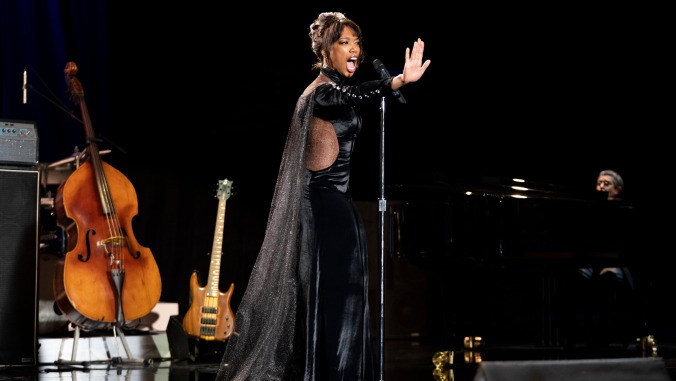Whitney Houston: I Wanna Dance With Somebody review: belter's biopic never quite hits the high note
Whitney Houston's songs are as catchy as ever, but Kasi Lemmons' film succumbs to familiar music biopic pitfalls without adding much to the singer's legacy

The grim downward spiral of musical megastars is, sadly, a path too well trodden. The small-town artist with staggering talent. The euphoric big break. The pressure from the tabloids. The sinister, money-grubbing manager. The tumble into substance abuse. These are the checkpoints we’ve seen time and again in the lives of famous musicians, and which we now see recreated in musical biopics. Whitney Houston: I Wanna Dance With Somebody, which recently added the “Whitney Houston” to the front of its title to ensure no fans accidentally missed the connection, is yet another of these somber-ish films in which we watch a genius throttle towards destruction in pop-tune-infused slow motion.
Having recently helmed both a biopic (Harriet) and a musical (Black Nativity), actor-director Kasi Lemmons is theoretically a perfect fit for this film, which is based on Anthony McCarten’s screenplay. And since McCarten also wrote 2018’s Oscar juggernaut Bohemian Rhapsody, that seems to be the blueprint the team here is working off most closely.
As with Bohemian Rhapsody, Dance With Somebody opens with its subject (Houston in place of Freddie Mercury) about to perform a career-defining live set (Live Aid for Mercury and the 1994 American Music Awards medley for Houston) before rewinding to their early days. The film rejoins Houston, played beautifully by the effervescent Naomi Ackie, as she hones her craft by singing backup for her mother Cissy (Tamara Tunie). Houston is then discovered by record mogul Clive Davis (Stanley Tucci) while singing “The Greatest Love of All,” and thus begins her rise to fame. A wrinkle, which viewers might not have been aware of, is Houston’s friendship/romantic relationship/business partnership with Robyn Crawford (Nafessa Williams, unrecognizable from her energy in Black Lightning). Houston’s queerness, her family’s disapproval of it, and her business’ impact on it weave their way through the film’s first act in a way that leaves the audience curious.
But the film’s second half covering Houston’s global success, her budding relationship with Bobby Brown (Moonlight’s Ashton Sanders), and her drug addiction means the queer plot line fades away. As in Bohemian Rhapsody, we get music video shoots, concert montages, recording studio sessions, and substance abuse binges as vehicles for the artist’s discography. And we watch Houston’s fallout with her shifty manager (in this case her father, played by Clarke Peters), her various methods of self-destruction, and her career high points, including The Bodyguard, singing before Nelson Mandela, and her Super Bowl National Anthem performance (although not The Prince Of Egypt, which feels like an oversight). This all culminates in an extended final concert sequence (again, as in Bohemian Rhapsody) in which Houston performs “I Loves You, Porgy,” “And I Am Telling You I’m Not Going,” and “I Have Nothing” epically at the American Music Awards, proving (if there was ever any doubt) that Houston was a one-of-a-kind talent and ending the film on a celebratory note.
Unfortunately, after so many musical biopics in the past few years, including Get On Up, Bohemian Rhapsody, Rocketman, and The United States Vs. Billie Holiday, this film feels like a copy-and-paste redux that’s little more than an excuse to listen to Houston’s greatest hits (which, to be fair, sound great). Houston’s sexuality, one of the most interesting aspects of this story, is abandoned on the wayside as the film progresses, and the audience is left wondering what her long-time relationship with Crawford meant. Delving further into this romance (friendship?), which was obviously integral to Houston’s life, could have elevated the film, giving it a message about queerness in media or bisexuality. Similarly, there are several scenes, including a tense radio interview, that touch on Houston’s complex relationship to race and her position within the Black community that never probe deeper.
While the ensemble delivers a string of strong performances, from Ackie’s emotional lip syncs (the producers rightfully decided not to try to replicate Houston’s one-of-a-kind voice), to Tucci’s grandfatherly caring, to Tunie’s sometimes harsh love for her daughter, the script seems to hold the audience at a distance, never fully fleshing these characters out. A slew of producers, including Houston’s relatives and Clive Davis himself, may be a contributing force to the pulled punches, and the PG-13 rating (which also hamstrung Bohemian Rhapsody) keeps the film from wading into the more truthful, unsavory bits of Houston’s life.
The film also makes the odd choice to never quite age Ackie aside from swapping out a series of wigs, which further adds to the feeling that reality received several coats of gloss before making it to the big screen. While spending two hours listening to Whitney Houston’s greatest hits will never be a waste of time, Dance With Somebody is a sanitized, trope-laden retelling of Houston’s life that lacks purpose and a point-of-view. A few YouTube rabbit holes, a Spotify playlist, and a rental of The Bodyguard (or The Prince Of Egypt) would perhaps be a more fitting tribute to one of the greatest artists of the past century.